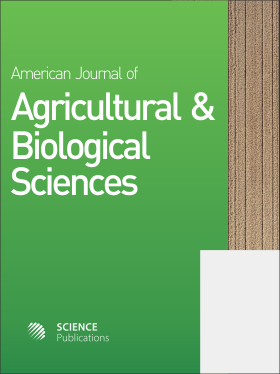Control of Anthracnose Caused by Colletotrichum musae on Curcuma alismatifolia Gagnep. Using Antagonistic Bacillus spp.
- 1 School of Agriculture Natural Resources and Enviroment, Tumbol Maeka, Naresuan University Phayao, Muang, Phayao, 56000, Thailand
- 2 Faculty of Pharmaceutical Sciences, Phitsanulok Naresuan University Phitsanulok, 65000, Thailand
- 3 Bard College, Annandale-on-Hudson, New York, 12504, United States
- 4 Department of Plant Pathology, Faculty of Agriculture, Chiang Mai University, Chiang Mai, 50200, Thailand
- 5 Department of Biology, Faculty of Science, Chiang Mai University, Chiang Mai, 50200, Thailand
Abstract
Over 400 bacterial strains, isolated from leaf surfaces of Curcuma alismatifolia Gagnep. and hot springs in the Chiang Mai province of northern Thailand, were screened in vitro for antagonistic activity against Colletotrichum musae, an anthracnose fungus. Three isolates provided greater than 75% growth inhibition of the fungus in vitro and were identified as Bacillus licheniformis, B. amyloliquefaciens and B. subtilis. Using in planta tests, B. amyloliquefaciens and B. subtilis were shown to efficiently colonize the curcuma bracts, provide a statistically significant growth suppression of C. musae over that of B. licheniformis, and all three isolates could provide 100% inhibition of conidial fungal germination. When B. licheniformis was co-inoculated in combination with either of the other two bacteria, the ability of B. amyloliquefaciens and B. subtilis to suppress the fungal disease was dramatically reduced. Both B. amyloliquefaciens and B. subtilis were found to contain an isoform of iturin A with antifungal activity against C. musae. As a preventative measure to control the spread of C. musae and reduce the severity of fungal infections, B. amyloliquefaciens could be used to inoculate curcuma flowers cost effectively and reduce the need for the toxic synthetic fungicides currently in use.
DOI: https://doi.org/10.3844/ajabssp.2007.54.61

- 7,446 Views
- 8,089 Downloads
- 20 Citations
Download
Keywords
- Antagonistic bacteria
- Colletotrichum musae
- Curcuma alismatifolia Gagnep
- Bacillus
- iturin
- fungicide alternative
